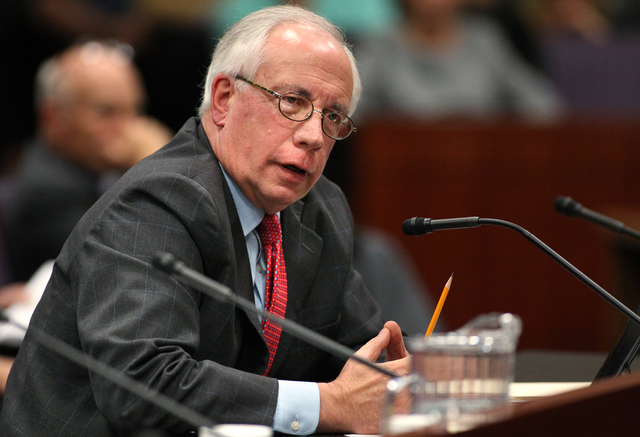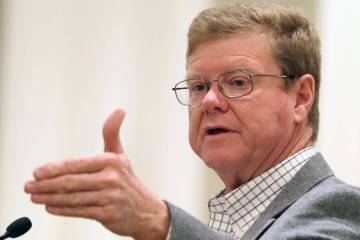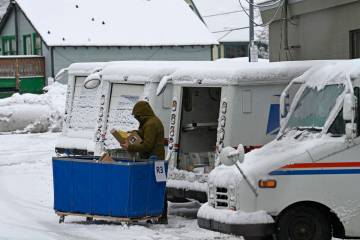Winery expansion bill pits big counties against rurals
CARSON CITY — The Assembly Commerce and Labor Committee was the stomping ground Friday for a bill to expand commercial wineries into Nevada’s two largest counties, a move backers said is needed to establish the industry.
Opponents countered that the industry’s future in the state, like good vino, takes years to mature.
Assembly Bill 4, sponsored by Assemblyman Pat Hickey, R-Reno, would remove an existing prohibition on commercial wineries in Clark and Washoe counties that prevents tasting rooms and sales on the premises.
The law originally enacted in the mid-1980s was viewed at the time as an economic development and tourism draw for Nevada’s rural counties, where grapes could be grown.
Opponents of the bill also said the reason for adding the prohibition for Clark and Washoe was to prevent big winemakers from California from moving into the state and setting up bottling facilities in competition with Nevada’s fledgling industry.
Nevada has four wineries, the fewest of any state in the nation. In contrast, Washington state, where the eastern part of the state has a climate similar to Northern Nevada, has seen its wine industry skyrocket, with grape sales of $166 million in 2012 and wine sales of $1 billion. Total economic impact was estimated at $8.6 billion.
Nationwide, the wine industry is estimated to generate $36 billion a year.
Experts said Nevada’s has the perfect climate for growing grapes and that grapes use less water than the state’s main agricultural crop, hay. Scientists from the University of Nevada, Reno said an acre of grapes requires one-seventh the amount of water needed for alfalfa.
Bolstering Nevada’s wine industry is also a priority for state economic development and tourism officials who say more wineries are needed to create “buzz.”
Wine tourists don’t take a trip to visit one winery, bill supporters said. They go to visit many and taste different brands and varieties.
“The more wineries we have will create an economic engine,” said Bruce Breslow, director of the state Department of Business and Industry. “We don’t have an economic engine. We have a day trip.”
California, renowned for its wineries, saw $23 billion in retail sales in 2013, and the number of wineries doubled over the past decade to 3,754.
“Realistically, Napa (California) would not be Napa if there were only two wineries,” said Randi Thompson, who was representing the Nevada Wine Coalition. “Vegas wouldn’t be Vegas if there were only two casinos.
“Critical mass is needed to make a vibrant wine industry, and we hope changing the law will help do that, which in turn will benefit the current winemakers,” she said.
Americans spent $36.3 billion on wine in 2013 and the volume has grown for 21 consecutive years, according to the coalition.
Bill Loken of Pahrump Valley Winery said he feared the bill as written would have unintended consequences and could allow the promotion of California wines and undermine decades of investment. The winery, he said, “is just beginning to produce highly-rated, in-demand Nevada wines.”
Production has increased from 100 cases in 2008 to 1,600 cases of 2013 vintage wine, he said, adding that total revenue for Nevada wines has grown from less than $20,000 in 2009 to an estimated $450,000 in 2013.
“The Nevada wine industry is just in the infant stage,” he said.
“We desire a growing wine industry that will become less reliant on out-of-state grape importation while encouraging alternate, lower water use crops,” Loken said in written testimony to the committee.
Lawmakers also expressed concerns of protecting the Nevada brand. Under federal regulations, 75 percent of grapes must be grown in the state for the product to be labeled as a Nevada wine.
But only about 40 acres of grapes are grown commercially in Nevada, according to Breslow.
More grapes are needed before there can be more wineries, opponents of the bill said.
“We’ve paid our dues … for an industry that didn’t exist 27 years ago in Nevada,” said Jack Sanders of Sanders Family Winery in Pahrump.
“We welcome and encourage wineries in the rural counties,” he said, adding, “Let’s get some Nevada-grown grapes so we can show our pure Nevada pride.”
No action was taken by the committee, and amendments were pending.
Contact Sandra Chereb at schereb@reviewjournal.com or 775-687-3901. Follow @SandraChereb on Twitter.




























